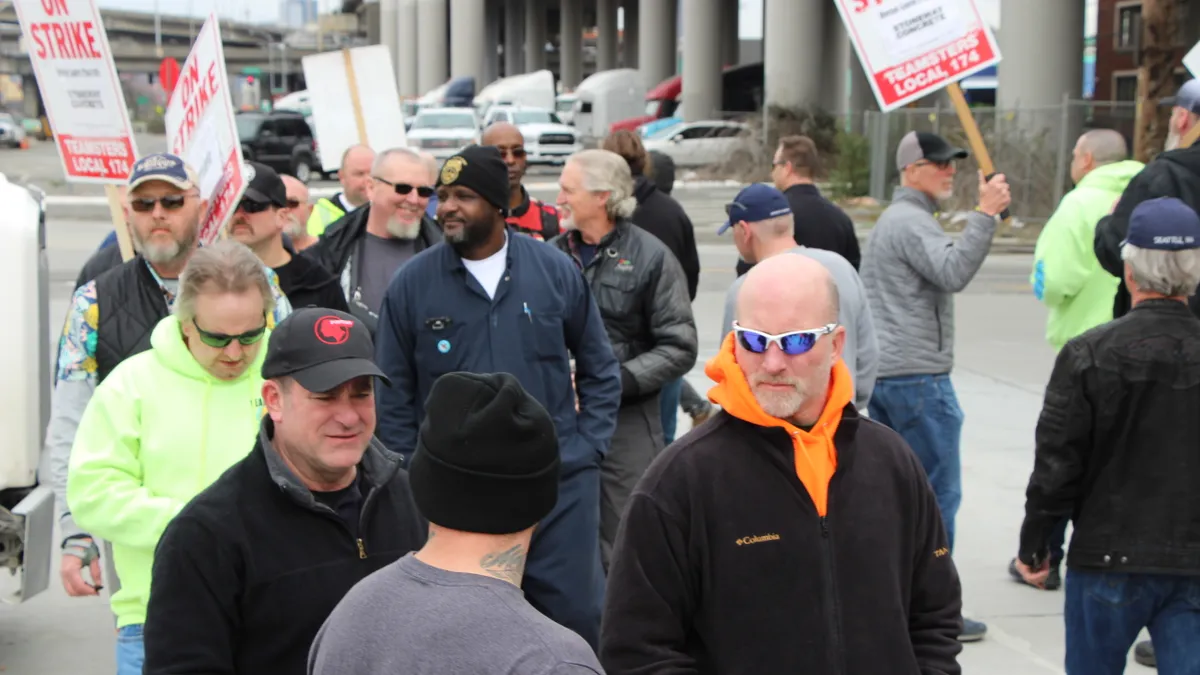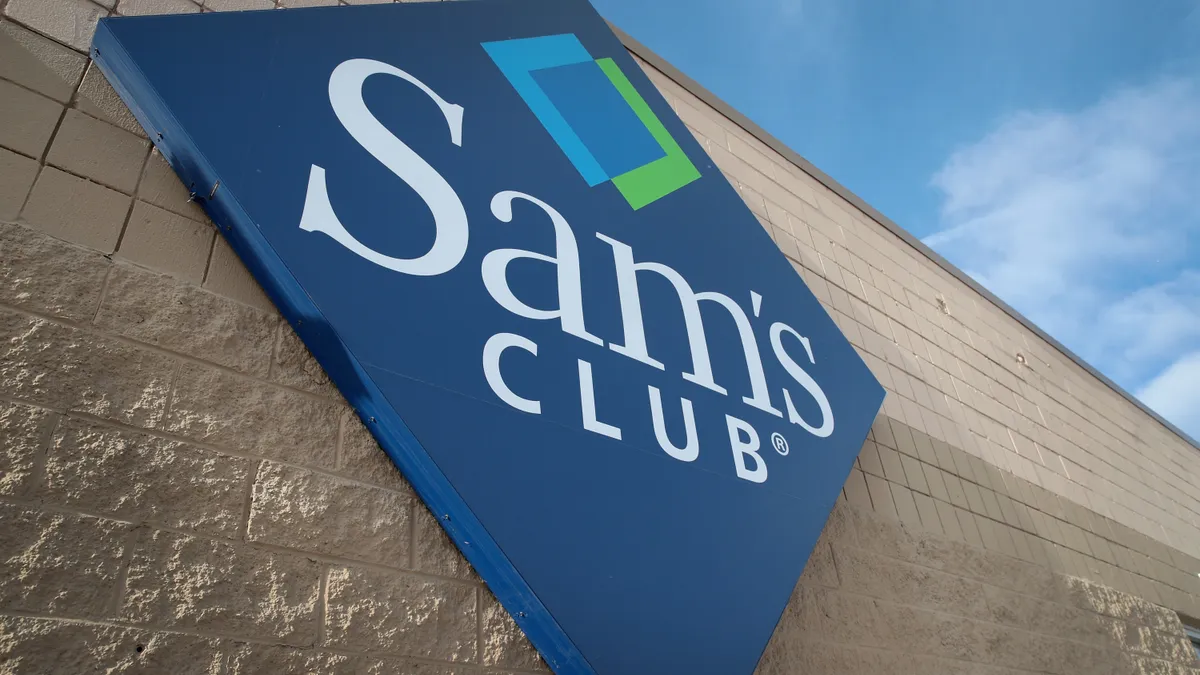If all of the missed concrete deliveries queued up, the line of trucks would stretch nearly 32 miles, as union drivers in Seattle walk the picket lines for the fifth month, delaying key projects and costing the region millions.
Teamsters Local 174 is demanding wage hikes to buffer inflation — which hit another 40-year high in February, with no relief expected soon — as well as enhanced healthcare benefits for recently retired workers.
On the other side of the bargaining table, Stoneway Concrete, Gary Merlino Construction, Cadman Materials, CalPortland, Salmon Bay Sand and Gravel and Lehigh Cement want drivers to return to work as soon as possible, believing their wage offer of an 18% increase over three years is generous.
The employers are caught between a rock — as ready-mixed concrete shortages inflate prices — and a hard place — as local politicians raise concerns of potentially illegal bargaining strategies between employers.
Meanwhile, the collateral damage of the strike, now Day 138, mounts daily as projects are delayed: Repairs to the West Seattle Bridge, the expansion of the Washington State Convention Center, modernization to a Microsoft campus and affordable housing projects, to name a few.
"You look at the skyline, there's a lot of cranes," said John Gallagher, public information officer for Sound Transit. "Basically, name any major project, it's impacted."
'Improper coordination'
Political stakes are rising with the economic toll.
The protest has attracted attention from high-level city officials, including King County Executive Dow Constantine, who wrote a memo to Seattle Attorney General Bob Ferguson, flagging potential "collusion" among the contractors.
Both Constantine and Ferguson are Democrats. The Biden administration has made promoting union labor a priority. Constantine's memo called for an investigation from Ferguson's office "to ensure that no improper coordination [among employers] is taking place."
Concrete company Glacier Northwest, which does business as CalPortland in Washington State, denied any wrongdoing.
"Glacier Northwest, along with any other company, is entitled to engage in joint bargaining," Pete Stoltz, manager of permitting and government affairs, said in a statement shared with Construction Dive. "The basis of any 'collusion' allegation, or the initiation of any inquiry or request for an investigation is a specious, politically motivated one, and is being driven by certain partisan parties seeking to abuse the legal process for the purpose of gaining leverage in a labor relations dispute."
The other employers did not respond to Construction Dive's requests for comment. Stoltz said he was authorized to speak as the media contact for four of the companies about joint bargaining, but couldn't speak on their behalf regarding allegations of collusion.
Labor trends
America is seeing a resurgence of union power unprecedented during the past 20 years, with recent wins at some Starbucks franchises and a historic vote last Friday to organize Amazon's warehouse on Staten Island. The e-commerce giant is the country's second-largest private employer.
A week before Amazon's vote, the International Brotherhood of Teamsters, emboldened by the 650,000-worker gap construction faces, donated $1 million to support the striking Seattle truckers, whose healthcare benefits expired Thursday for lack of hours worked.
"Even a relatively small local [union branch] can punch above its weight and have a high degree of leverage," said Mark Erlich, fellow at Harvard's Labor and Worklife Program.
"You look at the skyline, there's a lot of cranes. Basically, name any major project, it's impacted."

John Gallagher
Sound Transit
If no concrete gets delivered, many other jobs cannot begin.
Leon Johnson, president of Greater Seattle Concrete, said he quickly had to lay off 100 of his 170 workers when the strike began. Now, as some third-party drivers deliver concrete to his projects, he has to pay $200 to $250 per yard, double the normal price.
Some developers balked at those inflated prices. Greater Seattle Concrete paused one project, because third-party pours would inflate the project cost by $2 million, Johnson said.
The strike, however, also has tailwinds from the "unprecedented issues" nationwide for ready-mixed concrete, the average price of which jumped in February 3.2% from when the Seattle strike began, and 8.2% year over year, according to the Associated General Contractors of America.
Alan Sparkman, executive director of the Tennessee Concrete Association, encouraged builders nationwide to work closely with suppliers "to determine what is realistic in terms of scheduling and supply …"
A gathering storm
Understanding the factors driving the long-running labor dispute is paramount to evaluating its impacts. In November, 34 workers walked off the job in protest of unfair labor practices by Stoneway Concrete, part of the larger Gary Merlino Construction.
Within a month, the number on the picket line swelled to 330 as other concrete truck drivers and support staff from Teamsters Local 174 joined.
Four of the companies — CalPortland, Stoneway, Cadman and Salmon Bay — have engaged in joint bargaining with the workers, while Gary Merlino and Lehigh each negotiate a separate, individual contract with the workers, Stoltz confirmed to Construction Dive.
"The union's offer called for a 10.6% wage increase for its 'one year' contract, and a ratification bonus that would cost the companies more than $1.5 million combined," the four joint bargainers wrote in a statement. "This proposal was obviously unacceptable."
On March 24, the companies offered to pay for employee medical coverage that lapsed April 1. The next day, the International Brotherhood of Teamsters donated the $1 million to Local 174's cause, effectively neutering the companies' offer for extended health care coverage.
The four employers stipulated in their letter the workers return for at least 60 days to allow for continued negotiations.
The Teamsters turned their backs.
"The companies' 'offer' appears to simply be a request that our members end their strike and go back to work without progress or commitment to solving the serious problems that led our members to strike in the first place," Rick Hicks, secretary-treasurer of Teamsters Local 174 said in a statement shared with Construction Dive.
However, in mid-March, some 40 drivers for Salmon Bay, Cadman and one of Lehigh's locations offered to return to work in mid-March, in a "good faith gesture" to allow key infrastructure projects to resume.
Collusion allegations
The Teamsters claim the employers violated federal labor laws by failing to bargain in good faith for a successor agreement.
That's when their allegations found the ear of King County Executive Constantine, whose office published a request for qualifications to guarantee $35 million in concrete to meet the county's construction needs for the next three to four years.
The county received no bids.
Constantine sent his memo to Ferguson, raising concerns about illicit coordination before the window for proposals closed.
"I am concerned that coordination among the concrete companies has created an effective oligopoly and rendered fair and effective bargaining, including mediation, untenable," wrote Constantine.
Ferguson told Construction Dive his office has a longstanding policy of never commenting on investigations, including confirming or denying their existence.
"Six weeks ago, I met with workers on the picket line and heard their concerns," Ferguson said in a statement shared with Construction Dive, echoing his written response to Constantine. "Afterwards, my antitrust team followed up and met with the workers. I stand in solidarity with these workers in their fight for a fair contract."
More fallout
During the strike, companies have sought alternate ways to procure concrete, including leasing trucks and hiring and training drivers, National Public Radio affiliate KUOW reported.
That could raise concrete failure risks, wrote City Council Member Lisa Herbold. Concrete truck drivers not only operate the vehicles, but take responsibility for the calibration of the material so it arrives ready to pour on site, KUOW reported.
Johnson, Greater Seattle Concrete's president, said the third-party delivery drivers — often logging truck drivers — certainly have less concrete experience than the striking Teamsters, but hasn't seen any problems so far.
Herbold also said that the county had seen "ghost trucks," or unbranded concrete trucks or without Department of Transportation registration numbers to serve access sites for compliance reviews and safety monitoring.
Even ordering concrete from outside the Seattle area isn't a stopgap, because the materials can only travel for about 90 minutes before the solution loses its integrity.
All the while, the West Seattle Bridge remains closed.
On March 23, 2020, the bridge closed when inspection crews discovered cracks, shutting an artery for 100,000 vehicles a day, on average, according to the Seattle DOT. Work began in hopes of re-opening the span this summer.
Now, the bridge is simply one notable example of many projects under towering cranes across Seattle's skyline where deadlines grow increasingly fanciful.























